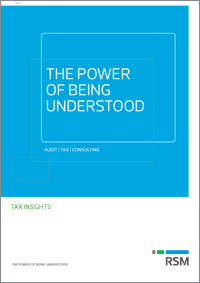As from 1 January 2022, the VAT recovery on imports into France is transferred from the Customs Authorities (DGDDI) to the Directorate General of Public Finances (DGFIP).
Here are the key elements of this change.
OLD REGIME UP TO DECEMBER 2021
Until December 2021, VAT due on the importation of goods into France was paid upon arrival of the goods in France at the moment of customs clearance. As a result, in some circumstances, businesses had to make an advance payment of the VAT due. This was especially the case for foreign entities. The VAT could subsequently be reimbursed through the periodic VAT return or through an 8th or 13th VAT directive refund claim.
The advance payment could be avoided by applying the reverse charge mechanism. This mechanism, which was subject to prior authorization, allowed import VAT to be no longer paid through the import customs declaration, but to be declared and deducted in the periodic VAT return, provided that all conditions were met.
Due to the administrative burdens of the authorization and the specific conditions, not all businesses could enjoy this reverse charge mechanism.
NEW REGIME AS FROM 1 JANUARY 2022: INTRODUCTION OF MANDATORY REVERSE CHARGE FOR FRENCH IMPORT VAT
In order to simplify the VAT import process, France introduces a mandatory and automatic reverse charge mechanism on imports of goods in France. French import VAT will no longer need to be paid upon arrival of the goods into France but will be pre-filled, reported and deducted in the periodic VAT returns, based on the information received from the French Customs Authorities.
The recovery of import VAT through the VAT return will apply to all taxable persons as well as to non-taxable persons who have a valid intra-Community VAT number in France. As a result, companies without a French VAT number will not be able to import goods into France.
CONSEQUENCES & TRANSITION PERIOD TILL 30 JUNE 2022
The main impact of this change is the obligation for the importer of the goods to be identified for VAT purposes in France, in order to benefit from this reverse charge mechanism.
Consequently, a foreign company without a French VAT number, wishing to import goods into France as from 1 January 2022, must register for French VAT purposes even if no other operations require a French VAT registration (e.g. imports followed by local supplies of goods to customers identified for VAT in France).
Although this reverse charge on import VAT is mandatory and automatic in France as from 1 January 2022, a transition period is granted by the French Tax Authorities until 30 June 2022 provided following conditions are met:
- only for those foreign companies that still do not have a French VAT number
- the French VAT registration request must be initiated before 1 March 2022 (and the foreign company can prove this)
- the French VAT number granted must be provided to the French Customs Authorities when making French imports no later than 30 June 2022, which is the end of the transition period
- during the transition period, a new special mention G0008 must be included on the Customs import declaration, to allow importation without valid French VAT registration: "Redevable non identifié à la TVA en France" (taxable person not identified for VAT purposes in France)
If foreign companies do not comply with those conditions and if the transitional date of 30 June 2022 has expired, foreign companies will see their import operations in France blocked at customs and will be imposed a penalty of 5% of the deductible VAT.
In case you think you would need a French VAT registration due to this change, we advise you to contact us as soon as possible (before the end of February at the very latest).
If you have any questions regarding this topic, don’t hesitate to contact our RSM Belgium | Tax team ([email protected]).
RSM Belgium | Tax

